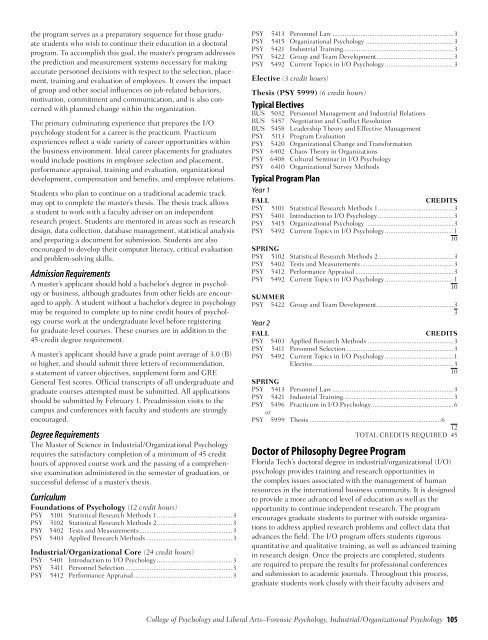2006–2007 - Florida Institute of Technology
2006–2007 - Florida Institute of Technology
2006–2007 - Florida Institute of Technology
Create successful ePaper yourself
Turn your PDF publications into a flip-book with our unique Google optimized e-Paper software.
the program serves as a preparatory sequence for those graduate<br />
students who wish to continue their education in a doctoral<br />
program. To accomplish this goal, the master’s program addresses<br />
the prediction and measurement systems necessary for making<br />
accurate personnel decisions with respect to the selection, placement,<br />
training and evaluation <strong>of</strong> employees. It covers the impact<br />
<strong>of</strong> group and other social influences on job-related behaviors,<br />
motivation, commitment and communication, and is also concerned<br />
with planned change within the organization.<br />
The primary culminating experience that prepares the I/O<br />
psychology student for a career is the practicum. Practicum<br />
experiences reflect a wide variety <strong>of</strong> career opportunities within<br />
the business environment. Ideal career placements for graduates<br />
would include positions in employee selection and placement,<br />
performance appraisal, training and evaluation, organizational<br />
development, compensation and benefits, and employee relations.<br />
Students who plan to continue on a traditional academic track<br />
may opt to complete the master’s thesis. The thesis track allows<br />
a student to work with a faculty adviser on an independent<br />
research project. Students are mentored in areas such as research<br />
design, data collection, database management, statistical analysis<br />
and preparing a document for submission. Students are also<br />
encouraged to develop their computer literacy, critical evaluation<br />
and problem-solving skills.<br />
Admission Requirements<br />
A master’s applicant should hold a bachelor’s degree in psychology<br />
or business, although graduates from other fields are encouraged<br />
to apply. A student without a bachelor’s degree in psychology<br />
may be required to complete up to nine credit hours <strong>of</strong> psychology<br />
course work at the undergraduate level before registering<br />
for graduate-level courses. These courses are in addition to the<br />
45-credit degree requirement.<br />
A master’s applicant should have a grade point average <strong>of</strong> 3.0 (B)<br />
or higher, and should submit three letters <strong>of</strong> recommendation,<br />
a statement <strong>of</strong> career objectives, supplement form and GRE<br />
General Test scores. Official transcripts <strong>of</strong> all undergraduate and<br />
graduate courses attempted must be submitted. All applications<br />
should be submitted by February 1. Preadmission visits to the<br />
campus and conferences with faculty and students are strongly<br />
encouraged.<br />
Degree Requirements<br />
The Master <strong>of</strong> Science in Industrial/Organizational Psychology<br />
requires the satisfactory completion <strong>of</strong> a minimum <strong>of</strong> 45 credit<br />
hours <strong>of</strong> approved course work and the passing <strong>of</strong> a comprehensive<br />
examination administered in the semester <strong>of</strong> graduation, or<br />
successful defense <strong>of</strong> a master’s thesis.<br />
Curriculum<br />
Foundations <strong>of</strong> Psychology (12 credit hours)<br />
PSY 5101 Statistical Research Methods 1 ...........................................3<br />
PSY 5102 Statistical Research Methods 2 ...........................................3<br />
PSY 5402 Tests and Measurements .....................................................3<br />
PSY 5403 Applied Research Methods .................................................3<br />
Industrial/Organizational Core (24 credit hours)<br />
PSY 5401 Introduction to I/O Psychology ...........................................3<br />
PSY 5411 Personnel Selection .............................................................3<br />
PSY 5412 Performance Appraisal ........................................................3<br />
PSY 5413 Personnel Law .....................................................................3<br />
PSY 5415 Organizational Psychology ..................................................3<br />
PSY 5421 Industrial Training ...............................................................3<br />
PSY 5422 Group and Team Development ............................................3<br />
PSY 5492 Current Topics in I/O Psychology .......................................3<br />
Elective (3 credit hours)<br />
Thesis (PSY 5999) (6 credit hours)<br />
Typical Electives<br />
BUS 5032 Personnel Management and Industrial Relations<br />
BUS 5457 Negotiation and Conflict Resolution<br />
BUS 5458 Leadership Theory and Effective Management<br />
PSY 5113 Program Evaluation<br />
PSY 5420 Organizational Change and Transformation<br />
PSY 6402 Chaos Theory in Organizations<br />
PSY 6408 Cultural Seminar in I/O Psychology<br />
PSY 6410 Organizational Survey Methods<br />
Typical Program Plan<br />
Year 1<br />
FALL CREDITS<br />
PSY 5101 Statistical Research Methods 1 ...........................................3<br />
PSY 5401 Introduction to I/O Psychology ...........................................3<br />
PSY 5415 Organizational Psychology ..................................................3<br />
PSY 5492 Current Topics in I/O Psychology .......................................1<br />
10<br />
SPRING<br />
PSY 5102 Statistical Research Methods 2 ...........................................3<br />
PSY 5402 Tests and Measurements .....................................................3<br />
PSY 5412 Performance Appraisal ........................................................3<br />
PSY 5492 Current Topics in I/O Psychology .......................................1<br />
10<br />
SUMMER<br />
PSY 5422 Group and Team Development ............................................3<br />
3<br />
Year 2<br />
FALL CREDITS<br />
PSY 5403 Applied Research Methods .................................................3<br />
PSY 5411 Personnel Selection .............................................................3<br />
PSY 5492 Current Topics in I/O Psychology .......................................1<br />
Elective ................................................................................3<br />
10<br />
SPRING<br />
PSY 5413 Personnel Law .....................................................................3<br />
PSY 5421 Industrial Training ...............................................................3<br />
PSY 5496 Practicum in I/O Psychology ...............................................6<br />
or<br />
PSY 5999 Thesis ...........................................................................6<br />
12<br />
TOTAL CREDITS REQUIRED 45<br />
Doctor <strong>of</strong> Philosophy Degree Program<br />
<strong>Florida</strong> Tech’s doctoral degree in industrial/organizational (I/O)<br />
psychology provides training and research opportunities in<br />
the complex issues associated with the management <strong>of</strong> human<br />
resources in the international business community. It is designed<br />
to provide a more advanced level <strong>of</strong> education as well as the<br />
opportunity to continue independent research. The program<br />
encourages graduate students to partner with outside organizations<br />
to address applied research problems and collect data that<br />
advances the field. The I/O program <strong>of</strong>fers students rigorous<br />
quantitative and qualitative training, as well as advanced training<br />
in research design. Once the projects are completed, students<br />
are required to prepare the results for pr<strong>of</strong>essional conferences<br />
and submission to academic journals. Throughout this process,<br />
graduate students work closely with their faculty advisers and<br />
College <strong>of</strong> Psychology and Liberal Arts–Forensic Psychology, Industrial/Organizational Psychology<br />
105

















